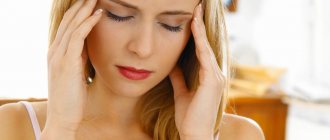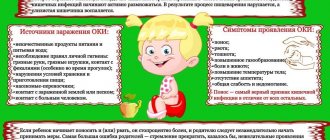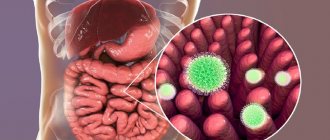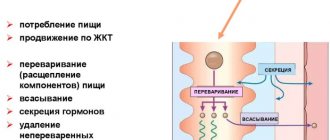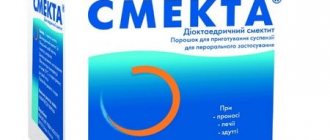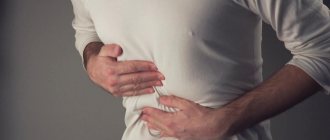A sedentary lifestyle, unhealthy foods, fluid deficiency in the body, taking potent medications, and sudden changes in climate conditions negatively affect the digestive process. The absence of a natural bowel movement for two days, discomfort and pain in various parts of the abdomen, deterioration in general well-being, and loss of appetite are the main symptoms of constipation. Next, we’ll take a closer look at why the stomach hurts when constipated.
Why does constipation cause pain?
Constipation pain can occur for the following reasons:
- Alimentary constipation. A lack of fluid in the body leads to hardening of stool in the intestines, which in turn begins to damage the delicate mucous membrane. Ultimately, discomfort and pain appear in various parts of the abdomen.
- Hypokinetic constipation. It develops in infants who cannot yet walk, bedridden patients and office workers who lead a sedentary lifestyle. Lack of physical activity leads to muscle weakness, which in turn cannot cope with the rapid removal of waste products from the body.
- Reflex constipation. Occurs due to diseases of the digestive system, for example, pathology of the colon.
- Toxic constipation. Problems with bowel movements occur due to long-term drug treatment or food poisoning. The level of beneficial bacteria in the body, which are responsible for the digestive process, decreases. Ultimately, decay products remain in the intestines and put pressure on its delicate mucous membrane. This is why unpleasant symptoms such as pain and discomfort are observed.
- Endocrine constipation. It appears due to a malfunction of the ovaries or thyroid gland.
- Mechanical constipation. The presence of mechanical obstructions in the intestines, which does not allow feces to leave the body in a timely manner.
- Stressful situations and mental disorders also negatively affect the digestive process, stopping natural bowel movements.
Causes and symptoms
Due to human activities
- Poor nutrition and fluid deficiency. Lack of fiber in the diet, unhealthy fatty, fried, smoked foods negatively affects the state of the digestive organs, and a lack of fluid in the body leads to the formation of dense stool and constipation, there is a feeling of a full stomach, nausea, heartburn, increased gas formation, the lower abdomen may hurt , and there is also pain during defecation;
- Ignoring the urge to defecate. Sometimes a person needs to restrain the urge due to various reasons, this can be done by strongly squeezing the pelvic muscles, but the intestinal walls are stretched, which causes constipation. With this disorder, a person feels nauseous, dizzy, increases fatigue, and experiences bloating.
- Sedentary lifestyle. If you are constantly in a sitting position, move little, and do not exercise, this affects the functioning of the digestive system, the process of digesting food slows down, and waste and toxins are released that remain in the body and are not eliminated during bowel movements.
- Diverticulitis. With diverticulitis, pressure in the intestines increases, this is primarily due to an unbalanced diet, in particular, a lack of fiber in the diet. Accompanied by inflammatory processes due to prolonged presence of feces in diverticula. Symptoms are pain in the lower abdomen, high fever, nausea, vomiting, and blood in the stool.
- Nervous tension. The autonomic nervous system is connected with the intestinal motility of the body, since with constant stress and anxiety, the transmission of impulses from the brain to the digestive organs slows down, which slows down the functioning of the gastrointestinal tract and provokes constipation. In this case, there are abdominal pains, reluctance to eat, and the person feels nauseous.
Due to illnesses
Problems with bowel movements may arise due to tumor formation in it.
- Neoplasms. When tumors and ulcers form, constipation occurs due to narrowing or compression of the intestinal walls, disruption of the process of formation and passage of feces through the colon. May be caused by hormonal imbalance, inflammation, etc. Symptoms - diarrhea or constipation, abdominal pain, bloating, belching, sleep disturbance.
- Inflamed hemorrhoids. Hemorrhoids often occur along with constipation; doctors often find it difficult to determine which is primary. With constipation, the process of defecation occurs with damage to the rectum, and anal fissures also form. In this case, there is itching and irritation near the anus, and after bowel movements there is pain in the lower abdomen.
- Irritable bowel syndrome. More often caused by infections of the gastrointestinal tract, due to treatment with antibiotics, as well as due to high activity of the intestinal muscles. In this case, there are constant cramps, pain or colic in the abdomen, sometimes diarrhea or constipation, and flatulence. The person is lethargic, has a headache and feels nauseous.
Other reasons
Constipation and abdominal pain are caused by:
Such symptoms can occur in people who are depressed.
- chronic pancreatitis;
- stomach ulcer;
- depression;
- sclerosis;
- stroke;
- endocrine system disorders.
If there is no bowel movement for 3 or more days, this indicates constipation. You should immediately take laxatives, and if there is still pain, you should consult a doctor, because serious diseases may develop.
Nature of pain
During problems with defecation, pain in the abdomen can be of a different nature.
So, constipation pain can be divided into several categories:
- Pain that occurs during the direct process of defecation, when stool comes out of the large intestine.
- Pain between the urge to defecate. In this case, pain can be observed in different parts of the abdomen.
- Diseases that occur with constipation can provoke pain. This includes appendicitis, cholecystitis or pancreatitis.
If you experience any unpleasant sensations, you should definitely consult a doctor.
Treatment
Many cases of constipation and abdominal pain will improve with home remedies or lifestyle changes.
If these don't work, your doctor may recommend medications for constipation. In severe cases, surgery may be required.
We will discuss these different treatment options below:
Home Remedies and Lifestyle Changes
The following tips may help relieve or prevent constipation and other bowel problems:
- eat more fiber-rich foods such as fruits, vegetables, whole grains and legumes
- drink plenty of water to keep your body hydrated
- exercise regularly
- Take a probiotic supplement to maintain a healthy balance of bacteria in your gut
- If you have the urge to go to the toilet, don't put it off
- do not rush bowel movements and make sure that the bowels are completely emptied
- do exercises to strengthen your pelvic floor muscles
The following material can help you get rid of constipation - How to get rid of constipation at home quickly: 16 best remedies.
Drug treatment
Several over-the-counter medications can help relieve constipation. Your doctor or pharmacist can advise you on suitable treatment options.
According to the NIDDK, the following over-the-counter laxative options may help:
- dietary supplements including Methylcellulose and Metamucil
- stool softeners such as Colace and Docusate
- osmotic agents such as Milk of Magnesia and Miralax
- lubricants such as mineral oil
- stimulant laxatives such as Korrektol and Dulcolax
Prescription medications for constipation include Lubiprostone, Linaclotide, Plecanatide, and Prucalopride.
Surgery
If constipation is caused by a structural problem, such as a blockage or muscle problem, your doctor may recommend surgery. However, doctors usually recommend surgery when other treatments have failed.
Abdominal pain
Constipation can be diagnosed in the complete or partial absence of the natural process of defecation for three days in adults, and two days in children. If after diarrhea your stomach hurts sharply and constipation appears, then you can already talk about serious problems. A sudden change from diarrhea to constipation is the main symptom of irritable bowel disease.
If all of the above symptoms are accompanied by an elevated temperature, then an inflammatory process in the intestines or the presence of a malignant tumor can be suspected. If such symptoms appear, you should definitely contact a gastroenterologist.
Survey
Special examinations are performed to diagnose constipation and determine the cause of abdominal pain. They consist of a general blood test and a sugar level test. Additionally, the following studies are carried out:
- colonoscopy, sigmoidoscopy, irrigoscopy - to study the intestines for the presence of pathological processes;
- fibrogastroduodenoscopy - to diagnose peptic ulcer;
- coprocytogram - to identify the inflammatory process in the intestines;
- stool analysis for the presence of helminth eggs and bacteriological examinations to determine the state of the intestinal microflora.
Based on the results obtained, the doctor will determine the cause of constipation and prescribe treatment.
Pain in the intestines
Constipation and pain occur almost simultaneously, because hard stool can damage the delicate lining of the intestines. Solid breakdown products slowly move through the gastrointestinal tract, causing discomfort in various parts of the abdomen.
It is recommended to try to eliminate intestinal pain and constipation through diet and exercise. Only as a last resort, drug treatment is prescribed.
Relief from constipation and back pain
Constipation, along with back pain, can be quite a depressing condition, as it can affect the performance of daily activities. If this condition gets worse, it can cause unwanted complications. Early diagnosis and treatment can help avoid this. The following are some recommendations for treating constipation and, accordingly, relieving back pain.
The best remedy for constipation is water. Drinking plenty of water helps maintain hydration in the body. In addition, water softens feces, facilitating their easier exit from the body. Including fiber-rich foods in your diet helps increase the bulk of your stool and pass it effortlessly. Junk food should be avoided as much as possible as poor diet is the main cause of constipation.
It is recommended to exercise regularly and properly. This helps improve health and prevent back pain. For severe constipation, laxatives are the best remedy. They provide 100% and quick results. However, before taking any medicine, you should consult your doctor. Acupuncture and massage may also be helpful. So, the next time you experience both constipation and back pain, try starting with treating the constipation rather than taking painkillers to relieve your back pain.
← Back
Next →
Read further:
- Which intestinal bacteria are dangerous to health?
- Can irritable bowel syndrome be treated with probiotics?
- Can constipation cause headaches?
- Symptoms and treatment of ulcerative colitis
- How to improve your gut health?
- Acupuncture - a remedy for constipation
- Apple juice - a remedy for constipation
- How effective are suppositories for constipation?
- Do I need to see a doctor if I have green diarrhea?
- What are the symptoms of metastatic colon cancer?
vitaminov.net
- Vitamins
- Diets for weight loss
- News
- List of diseases
- Your appearance
- How to quit smoking
- Nutrition
- Massage
- For women
- For men
- For travelers
- Computer and health
- Drug addiction and alcoholism
- Maintaining good health
- Everyone should know this
- Sex and health
- Sport
- Children
- Important Label Information
- Biological rhythms and sleep
- Nurse's Handbook
- Spine
- Allergy
- Medicines
- Drug Safety Rules
- Human anatomy
- Eastern medicine
- Virology
- Brain Physiology
- Other
Lower back pain
Pain in the lumbar area is one of the symptoms of kidney and genital disease. For example, it could be inflammation of the ovaries or pyelonephritis. Additionally, constipation pain can also occur during pregnancy. Every day the size of the uterus begins to increase and put pressure on the intestines. This is why the natural process of defecation is delayed with discomfort.
If you experience lower back pain, you should definitely consult a doctor in order to identify a possible serious illness in time. In this case, constipation can also be a symptom of an inflammatory process in the digestive system.
In the absence of pathologies, it is recommended to begin treating constipation with diet and exercise. Laxatives are prescribed only as a last resort if traditional methods do not help.
Characteristics of constipation
In this article we will look at why the lower abdomen may hurt due to constipation. But before this, it is necessary to define the concept of this pathological condition and its clinical manifestations, which is of great importance for differential diagnosis.
Main manifestations
Constipation can be suspected if the following complaints appear:
- The frequency of stool decreases to 3 or less times a week;
- A person experiences a transient feeling of heaviness, discomfort, bloating;
- The feces have acquired a denser consistency, reminiscent of “sheep feces” (in the form of small dense lumps);
- To empty the bowels, you need to exert much more physical effort than before;
- After constipation, a subjective feeling of incomplete emptying occurs;
- The patient experiences the need for manual assistance when performing bowel movements (cannot cope without manual assistance).
Quite often, the lower abdomen hurts, which in some cases may indicate serious diseases of the gastrointestinal tract. Ignoring these sensations is unacceptable. It is best to consult a doctor immediately to determine the cause of constipation and begin treatment immediately.
Pain in right side
If constipation occurs and the right side hurts, then gastritis can be suspected. Pain can occur both before and after eating. Dull pain is also observed on an empty stomach. The pain is dull and can occur simultaneously with a delay in the natural process of defecation. In addition, along with the pain, there is a feeling of acidity in the mouth and frequent belching.
If pain occurs under the shoulder blade or spreads throughout the back, then duodenitis can be diagnosed. In addition, symptoms such as weakness, vomiting and belching appear.
Treatment of pathology
First, a clinical diagnosis is carried out:
- general blood test and sugar content, stool;
- X-ray of the intestines;
- endoscopic examination;
- colonoscopy;
- fibrogastroduodenoscopy;
- sigmoidoscopy.
It is useful to take a course of herbal medicine. Treatment is most often carried out with medication, sometimes different means and methods of therapy are combined, an individual approach to each patient is required. Therapy is aimed at restoring the proper functioning of the stomach and intestines, since most often the cause of pain is improper functioning of the digestive organs. At the same time, it is important to correctly follow all the doctors’ recommendations so as not to cause the body to become addicted to the medications, which will not bring any effect.
Pain due to constipation is a fairly common phenomenon, since fecal stagnation disrupts intestinal function and causes discomfort. The pain that occurs due to prolonged absence of bowel movements does not have any differences and is similar to the symptoms of many diseases, so it is quite difficult to determine them.
Lower abdominal pain
If the lower abdomen hurts after constipation, this may indicate the presence of hemorrhoids. At the same time, other unpleasant symptoms appear, namely blood in the stool, itching and burning in the anus.
Pain in the lower abdomen and constipation are also accompanied by a deterioration in appetite and general well-being. The patient loses appetite, a white coating appears on the tongue and the temperature rises due to inflammation of the colon.
Treating hemorrhoids and constipation pain can only be done under the supervision of a doctor. A special diet is developed, anti-inflammatory drugs and mild laxatives are prescribed, which safely remove solid stool from the intestines.
When is a doctor needed?
You can use ointment or cream to relieve pain.
Pain in the rectum and lower abdomen does not necessarily indicate a serious pathological process, but some signs require medical attention. The patient should consult a doctor if the following symptoms are detected:
- Rectal pain becomes more pronounced, fever and weakness in the body appear.
- The pain spreads from the rectum to a large area of the abdomen.
- Passes more bloody clots in the stool.
- General signs of illness appear, including dizziness and pale skin.
- There is a feeling of a foreign body in the rectum or there is a suspicion of rectal prolapse.
The patient should immediately consult a doctor if he suspects hemorrhoidal thrombosis. Long-term blockage of veins can lead to serious consequences. Also, immediate medical attention is needed if you suspect heavy bleeding or colon cancer. Extensive blood loss may be accompanied by dizziness, pale skin and loss of consciousness.
How to treat rectal fistula, you will learn from the video:
First aid for constipation
Complete or partial absence of bowel movements for two days may indicate constipation. In this case, other unpleasant symptoms may occur, such as pain in various parts of the abdomen, deterioration of appetite and general condition. At the same time, the problem can be solved using safe and effective methods, but only after the doctor’s permission.
So, you can restore normal stool using the following methods:
- In the morning before breakfast, it is recommended to drink a glass of warm water with lemon juice and honey. This will start the digestive process and dilute solid waste in the intestines.
- Vegetable oil also helps soften hard stool. To do this, before eating, you need to drink a spoonful of olive or sunflower oil to restore a stable bowel movement process.
- Before going to bed, it is useful to drink yogurt with live cultures or kefir to get a positive laxative effect in the morning.
If the methods described above do not help, then you can try the following quick recipes for constipation:
- For emergency cases, a cleansing enema is suitable. To prepare it, you need to take any oil, for example, castor oil. For adults, no more than 50 ml is suitable. You should not abuse this method, because during the procedure, beneficial microorganisms that are responsible for the digestive process are also removed from the body.
- Microclyster. At the pharmacy you can buy special microenemas that allow you to quickly remove solid feces from the large intestine.
You should definitely consult a doctor if the following symptoms occur:
- Severe pain in various parts of the abdomen.
- Increased body temperature.
- The presence of blood in the stool.
- Alternating constipation and diarrhea.
Causes and main symptoms of constipation
Constipation or constipation is a phenomenon familiar to everyone without exception. Most often, constipation is a consequence of:
- improper nutrition - if the body does not receive enough coarse dietary fiber, which stimulates the motor function of the large intestine;
- insufficient fluid intake - if a person drinks little, stool thickens and moves harder through the intestines, stretching its walls and causing microtraumas;
- taking medications - there are some medications that cause constipation (you can read about this in the instructions for use);
- a sedentary lifestyle as a result of which the functioning of the intestinal muscles is disrupted;
- diverticulum, volvulus, adhesions, tumors and other pathologies in the intestine that can cause obstacles along the path of feces;
- some pathologies of the endocrine system can cause a slowdown in metabolic processes in the body.
Spastic constipation can be a consequence of prolonged nervous overstrain. In women, constipation can be observed during pregnancy, and 40% of women of childbearing age experience constipation with pain every month 4-5 days before menstruation.
In addition, constipation causes gastrointestinal diseases:
- exacerbation of chronic gastritis;
- chronic pancreatitis;
- cholecystitis;
- dyskinesia;
- diverticulosis;
- stomach ulcers;
- intestinal obstruction.
Constipation is considered a condition when:
- bowel movement does not occur within two days;
- feces come out hard and dry, sometimes in balls;
- after defecation there is a feeling of incomplete bowel movement.
Possible complications
If your stomach hurts after constipation, you should definitely consult a gastroenterologist to avoid the following side effects:
- Exacerbation of existing diseases of the digestive system. For example, gastritis, colitis, and inflammatory processes in the colon may develop.
- Feces in the large intestine begin to poison the body and suspend the normal functioning of important organs.
- Frequent constipation can lead to intestinal obstruction, which requires surgery.
- Hard feces can damage the delicate mucous membrane of the colon, developing an inflammatory process.
Prevention and treatment of pain
If there is acute, persistent or recurrent pain in the intestines of unknown etiology in men or women, you should consult a specialist to prevent further deterioration of the condition and the development of pathologies.
It is necessary to treat intestinal diseases with a clear understanding of the pathological processes taking place. Different types of pathologies require a specific approach.
For example, for common constipation, standard practice is to use laxatives, which should never be done if there is an intestinal obstruction.
By confusing similar symptoms after using enemas or laxatives, you can cause an aggravation of the condition, up to perforation of the walls of the organ.
Video:
Another example of improper prevention of intestinal diseases would be the frequent use of a variety of enemas.
For some reason, there is even a myth circulating among women and men that if you regularly do enemas, this will help you lose weight.
In fact, abuse and wanton use of such drugs can cause symptoms of weakened intestinal functions.
We can highlight general recommendations that will contribute to the normal functioning of the gastrointestinal tract:
- Do not abuse laxatives or do frequent enemas;
- when using laxatives, you should alternate them periodically so as not to cause the body to get used to a certain type of stimulation;
- The diet must include foods containing fiber. But if flatulence occurs after taking such products, you can try replacing them with nutritional supplements;
- Experts recommend the use of pectin. It is found in papaya and most other citrus fruits;
- It is necessary to drink clean water in sufficient quantity. It improves peristalsis, pushing food masses through;
- It is better to eliminate caffeine from your diet as a strong stimulant of peristalsis.
And even a non-specialist understands that healthy habits will help improve the functioning of the body, including the intestines.
It is recommended to take daily walks and do at least a minimum amount of exercise.
Proper nutrition, lack of stress and giving up bad habits will help you improve your health and get sick less often.
In order to know for sure why the intestines hurt, you need to find out the causes of the pain by visiting a competent gastroenterologist. After making an accurate diagnosis, the doctor will prescribe the most effective treatment for you. Only a qualified medical specialist will tell you exactly what to do with intestinal pain.
Preventing constipation
You can prevent the development of constipation by following these simple tips:
- First of all, you need to follow the principles of dietary nutrition. We prepare dishes from fresh and healthy ingredients using a safe cooking method. Products with coarse fibers, which quickly cleanse the body of toxins, are especially beneficial for the stomach.
- The daily intake should be divided into several small portions. The break between meals should not exceed three hours.
- If you are not prone to swelling, you need to drink a lot during the day. In addition to water, healthy compotes from dried fruits, vegetable and fruit juices, and decoctions based on medicinal herbs.
- Daily physical activity will help exercise your abdominal muscles and prevent constipation in the future. It is recommended to start the day with exercise to start the digestive process.


